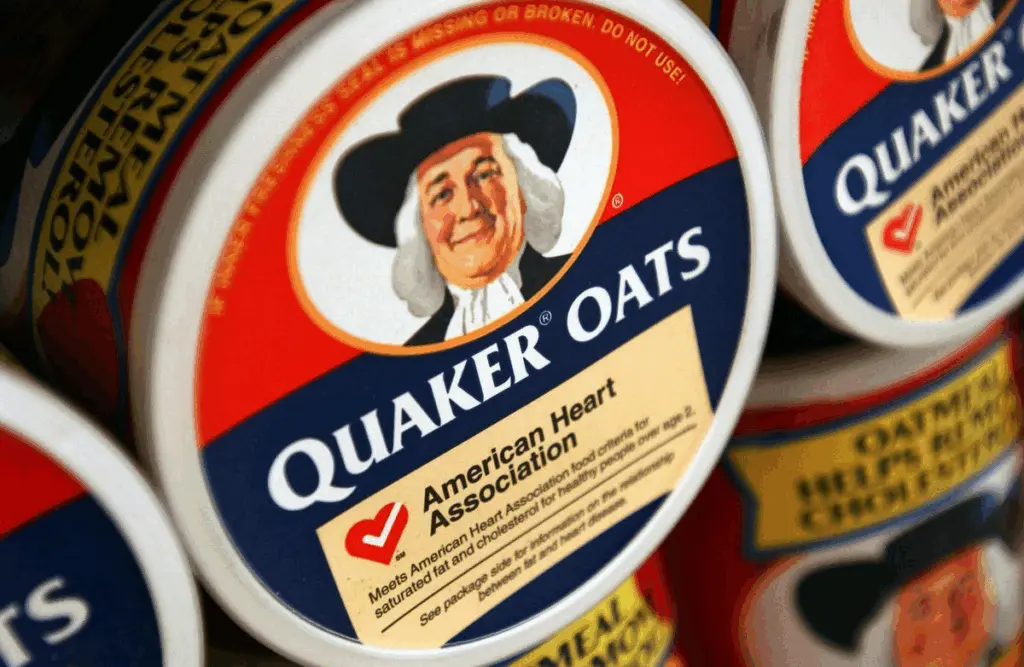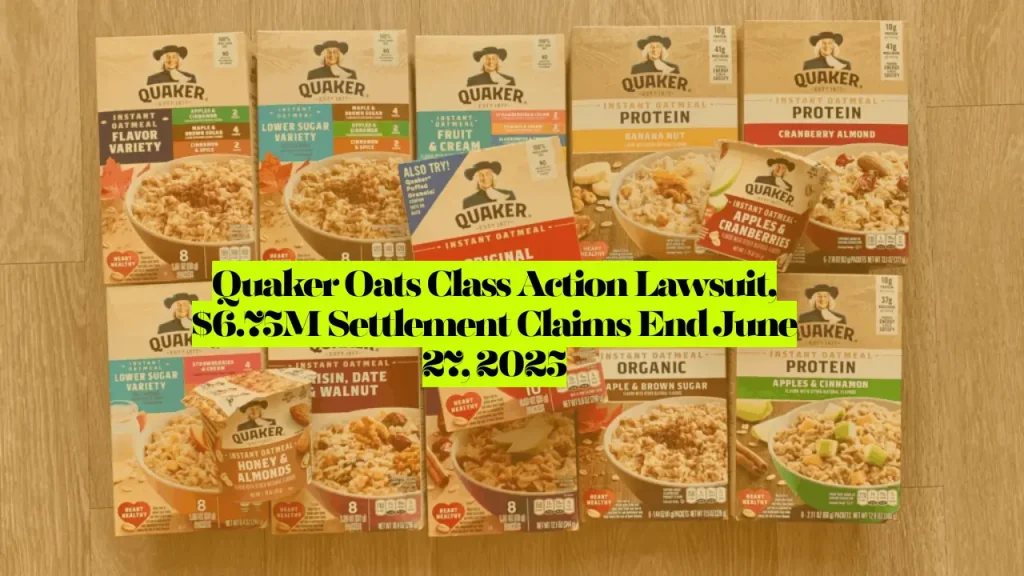Quaker Oats Class Action Lawsuit, $6.75M Settlement Claims End June 27, 2025
Two major Quaker Oats class action lawsuits have dominated headlines in 2024-2025, affecting millions of consumers who purchased popular breakfast cereals, granola bars, and snack products. Here’s everything you need to know about your rights, potential compensation, and critical claim deadlines.
The Quaker Oats Company has faced unprecedented legal scrutiny with multiple class action lawsuits alleging serious product safety violations. While one case resulted in a substantial $6.75 million settlement, another was dismissed, leaving consumers seeking clarity about their legal options and potential compensation.
The $6.75 Million Salmonella Settlement: What You Need to Know
Case Background and Recall Details
This class action lawsuit was filed after Quaker initiated a voluntary recall of certain food products in December 2023 and January 2024 due to potential Salmonella contamination. The recall was expanded on January 11, 2024 to include additional cereals, granola bars and snacks.
The lawsuit originated when hundreds of Quaker Oats products were recalled due to potential salmonella contamination. The Quaker class action lawsuit contended that the company failed to warn consumers that the products risked containing salmonella, a potentially life-threatening bacterium.
Legal Claims in the Settlement
Plaintiffs alleged that Quaker engaged in deceptive marketing and labeling practices related to the recall. The core allegations included:
Deceptive Marketing: Claims that Quaker falsely marketed recalled products as safe for consumption.
Failure to Warn: Allegations that the company didn’t adequately warn consumers about salmonella contamination risks.
Breach of Warranty: Claims that products didn’t meet safety standards implied by labeling and marketing.
Settlement Terms and Compensation
The Quaker Oats settlement benefits consumers who purchased certain Quaker Oats products that were recalled in December 2023 and January 2024 due to the risk of salmonella contamination.
Total Settlement Amount: $6.75 million
Individual Compensation: Full or partial refund of covered purchases.
Without Proof Requirements: Average retail price for up to two Quaker products per household, plus an additional 10% to cover sales taxes.
Table of Contents
Products Covered in the Settlement
The list includes dozens of items from popular lines like: Quaker Chewy Granola Bars (including Big Chewy, Dipps, Mini Dipps and additional products from these brands:
- Quaker cereals and oatmeal products
- Cap’n Crunch cereals
- Various granola bars and snack products
- Select Gatorade and Frito-Lay items
Critical Deadline Information
Final Claim Deadline: June 27, 2025
Eligibility Period: You purchased any of the Quaker Covered Products subject to the recall between the earliest date of distribution of any covered product and March 13, 2025.
Claim Requirements: Proof of Purchase – Not Required
Related lawsuit: Families Sue Camp Mystic Over Flash Flood Deaths of 27 Children and Staff

The Pesticide Lawsuit: Chlormequat Claims Dismissed
Background of the Pesticide Case
The Quaker Oats Company sells oat-based products that contain dangerously high levels of the pesticide chlormequat, a Quaker Oats class action lawsuit alleges.
New Rochelle resident, Lilian Fitzgerald brought a class action lawsuit against Quaker Oats on February 2, 2024 in the United States District Court of Southern District of New York.
Pesticide Contamination Allegations
The lawsuit against Quaker Oats contends that certain Quaker products contain up to 300 parts per billion of chlormequat, which is higher than the current safety threshold established by the Environmental Working Group (EWG).
Products Allegedly Affected: The affected Quaker products include Simply Granola Oats Honey & other granola and oatmeal products.
Health Concerns: Chlormequat is a pesticide used to control plant size by blocking hormones that stimulate growth, the Quaker Oats lawsuit explains.
Lawsuit Dismissal
Case Status: An Illinois federal judge dismissed the class action lawsuit on March 18, 2025, saying the consumers lacked standing due to EPA limits. It was dismissed with prejudice, which means it cannot be amended and refiled.
The dismissal significantly impacts consumers who were concerned about pesticide contamination, as the court found insufficient legal grounds for the claims under current EPA regulations.
How to File Your Salmonella Settlement Claim
Step-by-Step Filing Process
Step 1: Visit the official settlement website at www.FoodRecallSettlement.com
Step 2: Click where it says “If you do not have a Class Member ID”
Step 3: Complete the online claim form with your purchase information
Step 4: Submit your claim before the June 27, 2025 deadline
Documentation Requirements
No Receipts Needed: The settlement allows claims without proof of purchase for up to two products per household.
Optional Documentation: While not required, receipts can help maximize your potential payout.
Household Limit: Claims are limited to two products per household without proof of purchase.
Related Lawsuit: FanDuel Faces Multiple Lawsuits, Users Can Claim Compensation from $95M in Legal Cases

Legal Implications and Consumer Rights
Settlement vs. Lawsuit Outcomes
The contrasting outcomes of these two cases highlight important legal principles:
Successful Settlement Factors: The salmonella case succeeded because it involved actual product recalls and documented safety violations.
Dismissed Case Factors: The pesticide lawsuit failed due to existing EPA regulations that the court found adequate.
Consumer Protection Lessons
Recall Response: Companies must adequately warn consumers about safety risks during product recalls.
Regulatory Compliance: EPA pesticide limits provide legal protection for manufacturers when followed.
Class Action Viability: Successful cases require demonstrable harm or clear regulatory violations.
Frequently Asked Questions
Q: What is the deadline to file a claim in the Quaker Oats settlement?
A: The final deadline is June 27, 2025. You must submit your claim form online or by mail before this date to be eligible for compensation.
Q: Do I need receipts to file a claim?
A: Proof of Purchase – Not Required. You can file a claim for up to two products per household without receipts and receive the average retail price plus 10% for taxes.
Q: Which products are covered in the settlement?
A: The list includes dozens of items from popular lines like: Quaker Chewy Granola Bars (including Big Chewy, Dipps, Mini Dipps), plus various cereals, Cap’n Crunch products, and select snack items recalled due to salmonella risk.
Q: How much money can I receive from the settlement?
A: Full or partial refund of covered purchases. Without receipts, you’ll receive the average retail price for up to two products plus 10% for taxes from the $6.75 million settlement fund.
Q: What happened to the pesticide lawsuit?
A: An Illinois federal judge dismissed the class action lawsuit on March 18, 2025, saying the consumers lacked standing due to EPA limits. It was dismissed with prejudice, which means it cannot be amended and refiled.
Q: Can I still file a pesticide-related claim against Quaker Oats?
A: No. The pesticide lawsuit was dismissed with prejudice, meaning it cannot be refiled or amended. The court found that EPA regulations provided adequate consumer protection.
Q: What if I purchased products during the recall period?
A: You purchased any of the Quaker Covered Products subject to the recall between the earliest date of distribution of any covered product and March 13, 2025. You’re eligible for the settlement if you bought covered products during this period.
Q: How do I know if my specific product is covered?
A: Visit www.FoodRecallSettlement.com for the complete list of covered products. Find the full list of products included HERE on the official settlement website.
Q: What was the basis for the salmonella lawsuit?
A: Plaintiffs alleged that Quaker engaged in deceptive marketing and labeling practices related to the recall. The case centered on claims that Quaker failed to adequately warn consumers about contamination risks.
Q: Is this settlement final?
A: Yes, the $6.75 million settlement has been approved and is currently in the claims period. You will get your share of $6,750,000.00 based on valid claims submitted before the deadline.
Key Takeaways for Consumers
Immediate Action Required
Time-Sensitive: With the June 27, 2025 deadline approaching, eligible consumers must act quickly to submit claims.
No-Risk Filing: Since proof of purchase isn’t required, there’s no downside to filing a legitimate claim.
Multiple Product Coverage: The settlement covers numerous popular Quaker Oats product lines.
Legal Precedent Established
Recall Responsibility: Companies must provide adequate consumer warnings during product recalls.
Regulatory Protection: Existing EPA pesticide regulations provide legal protection for manufacturers.
Class Action Requirements: Successful cases require clear harm or regulatory violations.
Official Resources and Next Steps
Settlement Website
Visit www.FoodRecallSettlement.com for official claim forms and detailed product lists.
Legal Representation
Consumers in the State of New York who purchased any of the named products may be eligible to join this lawsuit, though the pesticide case has been dismissed.
Consumer Protection
This case demonstrates the importance of product safety monitoring and the legal remedies available when companies fail to adequately protect consumers.
Important Disclaimer: This article provides educational information about recent legal developments and should not be considered legal advice. The June 27, 2025 claim deadline is critical for potential settlement participants. For specific legal questions, consult with a qualified attorney.
Case Information:
- Salmonella Settlement: Case No. 7:24-cv-00526-KMK
- Pesticide Case: Dismissed with prejudice March 18, 2025
About the Author

Sarah Klein, JD, is a licensed attorney and legal content strategist with over 12 years of experience across civil, criminal, family, and regulatory law. At All About Lawyer, she covers a wide range of legal topics — from high-profile lawsuits and courtroom stories to state traffic laws and everyday legal questions — all with a focus on accuracy, clarity, and public understanding.
Her writing blends real legal insight with plain-English explanations, helping readers stay informed and legally aware.
Read more about Sarah
